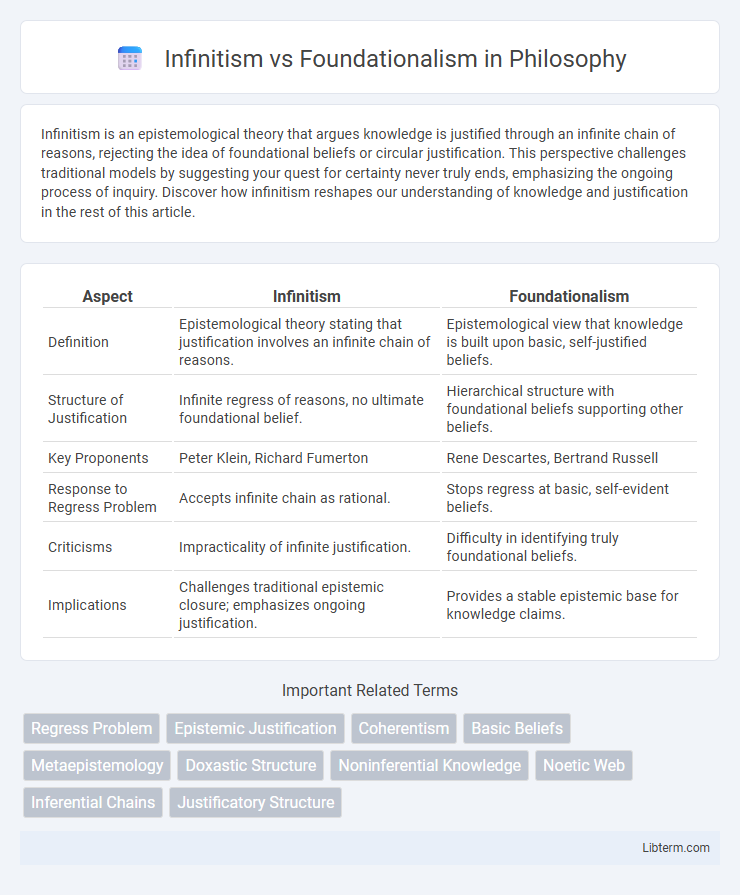Infinitism is an epistemological theory that argues knowledge is justified through an infinite chain of reasons, rejecting the idea of foundational beliefs or circular justification. This perspective challenges traditional models by suggesting your quest for certainty never truly ends, emphasizing the ongoing process of inquiry. Discover how infinitism reshapes our understanding of knowledge and justification in the rest of this article.
Table of Comparison
| Aspect | Infinitism | Foundationalism |
|---|---|---|
| Definition | Epistemological theory stating that justification involves an infinite chain of reasons. | Epistemological view that knowledge is built upon basic, self-justified beliefs. |
| Structure of Justification | Infinite regress of reasons, no ultimate foundational belief. | Hierarchical structure with foundational beliefs supporting other beliefs. |
| Key Proponents | Peter Klein, Richard Fumerton | Rene Descartes, Bertrand Russell |
| Response to Regress Problem | Accepts infinite chain as rational. | Stops regress at basic, self-evident beliefs. |
| Criticisms | Impracticality of infinite justification. | Difficulty in identifying truly foundational beliefs. |
| Implications | Challenges traditional epistemic closure; emphasizes ongoing justification. | Provides a stable epistemic base for knowledge claims. |
Introduction to Epistemological Theories
Infinitism and Foundationalism represent contrasting epistemological theories addressing the structure of justification in knowledge. Foundationalism asserts that certain basic beliefs serve as the ultimate justification without requiring further support, while Infinitism holds that justification is an endless chain of reasons, with no foundational beliefs terminating the sequence. These theories illuminate fundamental debates about the possibility of achieving certainty and the nature of rational support in epistemology.
Defining Infinitism: An Endless Justification
Infinitism asserts that justification for any belief requires an infinite chain of supporting reasons, rejecting the notion of foundational or self-evident beliefs. Unlike Foundationalism, which posits basic beliefs as stopping points for justification, Infinitism demands an unending series of evidence to avoid epistemic circularity. This theory emphasizes the necessity of continuous, non-repetitive reasons to sustain knowledge indefinitely.
Foundationalism Explained: The Search for Basic Beliefs
Foundationalism asserts that knowledge is structured upon basic beliefs that are self-evident, infallible, or evident to the senses, serving as the ultimate justification for other non-basic beliefs. These foundational beliefs provide a secure base that stops the infinite regress problem faced by other theories like infinitism. The search for such basic beliefs involves identifying indubitable truths or axioms that underpin scientific knowledge, mathematical principles, and everyday perceptions.
Historical Development of Infinitism and Foundationalism
Infinitism and foundationalism emerged as key theories in epistemology to address the problem of infinite regress in justification. Foundationalism traces its roots to Aristotle and was further developed by Descartes, who emphasized basic beliefs as self-evident foundations for knowledge. Infinitism, less historically prominent, gained attention in the 20th century through philosophers like Peter Klein, advocating that an infinite, non-repeating chain of reasons can provide justification.
Core Arguments Supporting Infinitism
Infinitism argues that knowledge justification involves an infinite, non-repeating chain of reasons, rejecting the epistemic regress problem faced by foundationalism and coherentism. It maintains that each belief is supported by another in an endless sequence, allowing for continuous justification without arbitrary stopping points or circularity. This perspective challenges foundationalism's reliance on self-evident or basic beliefs by emphasizing the infinite, dynamic nature of rational support in epistemic justification.
Foundationalism’s Main Tenets and Justifications
Foundationalism asserts that knowledge is structured like a building, resting on basic, self-evident beliefs called foundational beliefs that do not require further justification. These foundational beliefs justify higher-level, non-basic beliefs through a hierarchical system of support, ensuring the coherence and stability of knowledge. Foundationalism aims to avoid infinite regress in epistemic justification by positing indubitable or evident core beliefs as the epistemic groundwork.
Criticisms of Infinitism
Infinitism faces criticism for its reliance on an infinite chain of justification, which many argue is impractical and cognitively demanding. Critics claim that maintaining endless reasons without a foundational base undermines the possibility of certain knowledge. This infinite regress challenges the coherence and applicability of infinitism as a robust epistemological theory compared to foundationalism.
Challenges Facing Foundationalism
Foundationalism struggles with the challenge of identifying indubitable basic beliefs that can serve as a secure foundation for knowledge without falling into arbitrariness or circularity. Critics argue that foundational beliefs may lack the necessary justification or may be overly rigid, failing to accommodate the dynamic and contextual nature of human knowledge. This has led to difficulties in addressing the regress problem and maintaining a coherent epistemic structure.
Comparative Analysis: Strengths and Weaknesses
Infinitism posits an infinite chain of justification, offering flexibility and avoiding arbitrary foundational beliefs but faces criticism for practical implausibility and cognitive demands. Foundationalism relies on self-evident or indubitable beliefs as a basis, providing clear stopping points and epistemic certainty, though it risks dogmatism and challenges in identifying truly foundational beliefs. Comparative analysis reveals Infinitism's strength in avoiding dogmatic bases, with weakness in infinite regress, while Foundationalism excels in cognitive manageability but struggles with foundational skepticism.
Contemporary Debates and Future Directions
Contemporary debates in epistemology revolve around Infinitism and Foundationalism as competing theories about the structure of justification, with Infinitism advocating for an infinite, non-repetitive chain of reasons, contrasting sharply with Foundationalism's reliance on basic, self-justified beliefs. Recent scholarly discussions emphasize the feasibility of infinite regress in Infinitism against the cognitive limitations and epistemic closure challenges faced by Foundationalism. Future directions involve exploring hybrid models that integrate elements of both theories, alongside advancements in cognitive science and formal epistemology informing the plausibility and applicability of infinite regress in human knowledge systems.
Infinitism Infographic

 libterm.com
libterm.com